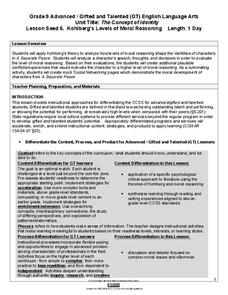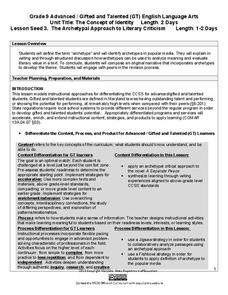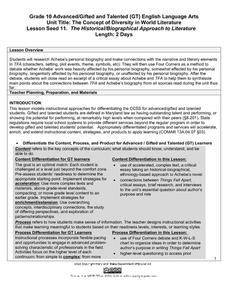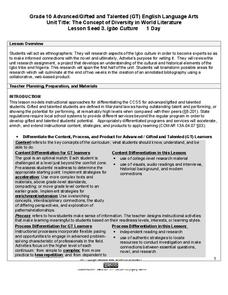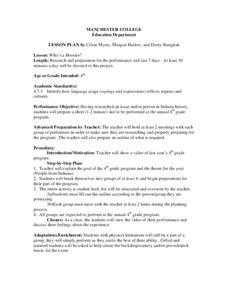Maryland Department of Education
The Concept of Identity Lesson 6: Kohlberg's Levels of Moral Reasoning
How does our moral reasoning shape our identity? After a study of Kohlberg's Levels of Moral Reasoning, readers use Kohlberg's theories to analyze the speech, thoughts, and decisions of a character in A Separate Peace. They then create...
Maryland Department of Education
The Concept of Identity Lesson 7: Logical Fallacies
What are the effects of competition in an academic environment? The competition between the main characters in A Separate Peace motivates a series of activities that asks readers to take a stance on competition, and then to develop a...
Maryland Department of Education
The Concept of Identity Lesson 8: Propaganda in Visual Media
Visual and print propaganda are featured in a lesson that asks readers of A Separate Peace to examine the techniques used in propaganda from World War I, World War II, presidential elections, and in the novel.
Maryland Department of Education
The Concept of Identity Lesson 3: The Archetypal Approach to Literary Criticism
As class members continue their study of approaches to literary criticism, readers examine the symbolism and archetypal patterns in John Knowles' A Separate Peace, and how these parallels are used to develop a theme in the story.
Maryland Department of Education
The Concept of Identity Lesson 4: The Psychological Approach
Readers apply Sigmund Freud's theories of the unconscious mind and the psychological approach to literary criticism to analyze and evaluate the relationship between two characters in A Separate Peace.
Maryland Department of Education
The Concept of Diversity in World Literature Lesson 12: Author's Purpose - Yeats and Achebe
Is there such a thing as fate/luck? Can one fight destiny? As part of their study of Chinua Achebe's purpose in writing Things Fall Apart, class members answer these questions from Achebe's point of view and then from William Butler...
Maryland Department of Education
The Concept of Diversity in World Literature Lesson 13: Unit Culmination - Symposium
To conclude a unit on the concept of diversity in world literature, class members conduct a symposium on "African Literature in Global Perspectives." In order to earn a spot on the panel, individuals craft an original thesis that...
Maryland Department of Education
The Concept of Diversity in World Literature Lesson 10: Author's Purpose Seminar
Why did Chinua Achebe write "An Image of Africa: Racism in Conrad's Heart of Darkness" in response to Conrad's novel? As part of a study of Things Fall Apart, class members conduct a socratic seminar focused on Achebe's purpose and...
Maryland Department of Education
The Concept of Diversity in World Literature Lesson 11: The Historical/Biographical Approach to Literature
How affected is Thinks Fall Apart by Chinua Achebe's personal biography? Using a four corners strategy, and evidence from their readings, class members debate the degree of biographical influence in Achebe's novel.
Maryland Department of Education
The Concept of Diversity in World Literature Lesson 9: Debating Imperialism
To gain an understanding of Imperialism, class members read Rudyard Kipling's poem, "The White Man's Burden" and Mark Twain's essay, "To the Person Sitting in Darkness." Groups compare these perceptions of non-white cultures with the...
Maryland Department of Education
The Concept of Diversity in World Literature Lesson 7: Cultural Commentary
As part of their study of Things Fall Apart, class groups develop a multimedia presentation in response to the question, "In what ways does Achebe use literature as a means to express and comment on culture and history?"
Maryland Department of Education
The Concept of Diversity in World Literature Lesson 8: Nonfiction Close Reading
As part of their study of Things Fall Apart, class members conduct a close reading of a section of Chinua Achebe's essay, "An Image of Africa: Racism in Conrad's Heart of Darkness." Jigsaw groups then compare the voice in the essay...
Maryland Department of Education
The Concept of Diversity in World Literature Lesson 1: Unit Introduction
To launch a unit study of the concept of diversity in World Literature, class members compare Chinua Achebe's essay, "An Image of Africa: Racism in Conrad's Heart of Darkness" and Richard Rodriguez's essay, "The Chinese in All of Us: A...
Maryland Department of Education
The Concept of Diversity in World Literature Lesson 3: Igbo Culture
What cultural concepts must readers understand in order to connect to Things Fall Apart? As part of their study of Chinua Achebe’s novel, class members research Nigeria and the Igbo culture to create a collaborative, web-based, annotated...
Maryland Department of Education
The Concept of Diversity in World Literature Lesson 4: Proverbs
"Eneke the bird says since men have learnt to shoot without missing, he has learnt to fly without perching." As part of their study of Things Fall Apart, class members read Paul Hernadi and Francis Steen's essay, "The Tropical Landscapes...
Curated OER
Incorporating Artifacts and Guest Speakers into Curriculum Planning
Artifacts and guest speakers are enriching and exciting for your students.
Curated OER
Where Did the Science Experiments Go?
Hands-on science experiments are essential for student learning.
Curated OER
I'm done! Now, what can I do in Math?
Here are some ways to avoid having bored students or a stressed out teacher when students finish their math work quickly.
Curated OER
Communication Skills Center Ideas for the Early Finisher
When students finish work early, there are easy ways to keep them focused and learning with independent activities.
Civil War Trust
Civil War Play
Raise the curtain to a class play that depicts the Civil War through both factual information and literary devices. The performance showcases the Battle of Antietam (Battle of Sharpsburg) and brings attention to women's roles, as well as...
Curated OER
Who's a Hoosier?
What is a Hoosier? 4th graders will identify sayings/expressions to reflect a region or culture. They will research Indiana history to work in groups to prepare for the annual 4th grade program where they will present the information...
Curated OER
The Art of Interpreting Percent
Ddefine the relationships between fractions, decimals, and percentages in a series of lessons. The class practices converting between these three versions of a number. They also find the common factor of a numerator and denominator and...
Curated OER
Using Poetry in Teaching Reading to Special Education Students
A series of well-written activities, these lessons prompt middle schoolers reading below grade level (at a second, third, or fourth grade level) to use poetry to practice basic reading skills. They rhyme, build words, make inferences,...
Curated OER
Vocabulary Cards 2nd Grade A-L
Use a set of math vocabulary cards to enrich your second graders' knowledge. Whether you bring the cards to a math center or put them on a word wall, this resource will help even your struggling math learners with basic definitions and...
Other popular searches
- Gifted and Talented Math
- Gifted and Talented Education
- Gifted and Talented Lessons
- Gifted and Talented Reading
- Gifted and Talented Science
- Gifted and Talented Art
- Gifted and Talented Writing
- Gifted and Talented Students
- Gifted and Talented Music
- Talented and Gifted
- Gifted and Talented Projects
- Gifted and Talented Esl


